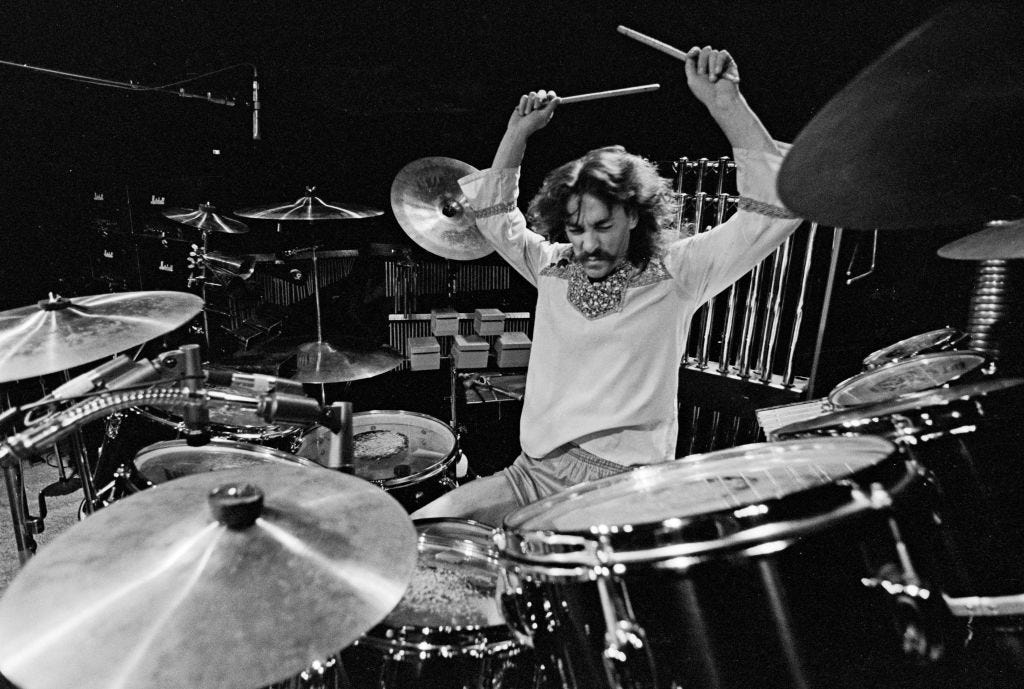The audio for today’s post is free for everyone. Listen here.
In 2011, I interviewed drummer Neil Peart for the Los Angeles Times and thought, What a nice guy. In 1974, the founders of the rock band Rush met Neil Peart when he auditioned for them and at first they thought, What a weird guy.He still got the job, and music history was made, changing the spirit of radio for decades to come.
--On This Day in History Shit Went Down: July 29, 1974--
To get the story of Peart’s audition, I talked to the band’s guitarist Alex Lifeson. Alex formed Rush in 1968 in Toronto with neighbor John Rutsey on drums; Lifeson’s best friend, Geddy Lee, joined as bassist and singer a short time later. By 1974, with help from Cleveland radio DJ Donna Halper playing their music, Rush had a U.S. record deal and an American tour booked. But Rutsey’s health wouldn’t allow for the rigors of touring; the band needed to find a replacement, fast. Late in July of 1974 they auditioned three drummers; Neil was second. “We felt an obligation to audition the third guy,” Alex told me. “We were being polite. We had already decided that Neil was absolutely the guy.”
Sarcastically, Alex referred to himself and Geddy as “hip and cool” with waist-length hair and satin pants. Neil showed up driving his mom’s Pinto. “He was a very nerdy-looking guy with short hair,” Lifeson said. “But when he set up his drums and started playing, we were just blown away.” The connection went beyond Peart’s drumming prowess. “He arrived at noon and stayed until eleven at night and we just jammed and then sat around, and we talked and laughed a lot. That was the thing that stood out, that we had camaraderie. We talked about books and social issues and then we’d jam for another hour then maybe smoke a joint and talk about more stuff. It was just an instant connection with him.” Geddy Lee turned twenty-one on July 29, 1974. For a gift, he got a new band member.
At the time, Alex didn’t understand how much Neil’s joining would change the direction of Rush. “We were just excited to be on tour in America,” he said. “It wasn’t until we started writing material for Fly by Night [Rush’s second album, the first with Neil] a couple months after he joined” that Lifeson realized the band was on a different path. That album, Alex explained, was written using acoustic guitars in the backs of cars. He described Neil as “very intelligent and well read” and so he was given the job of penning lyrics while they composed the tunes “bounding down highways on the way to the next gig.”
“Our beginnings were bands like Cream and Zeppelin, but we wanted to grow out of that,” Lifeson told me. “We wanted our own identity. I don’t think that really happened until 2112 [the band’s third album with Peart] that we felt we were our own band.” The record company wasn’t impressed with the previous two albums and told Rush to write some hits, but the band went in the opposite direction with 2112, deciding to go down in a “blaze of glory,” creating a dystopian-future-themed album that was not at all radio-friendly. And yet, word of mouth made the 1976 release into a massive seller.
Despite critics regularly excoriating the band, opining that Geddy Lee’s voice sounded like “a cat being chased out the door with a blowtorch up its ass” and declaring Neil’s lyrics “smug, hypocritical, pseudo-symbolic drivel,” Rush would be awarded fourteen platinum and three multi-platinum albums in the United States, and was inducted into the Rock & Roll Hall of Fame in 2013. Their lasting legacy has been their influence on other bands, inspiring acts such as Foo Fighters, Nine Inch Nails, Rage Against the Machine, Smashing Pumpkins, and Metallica. Peart is considered one of the greatest rock drummers of all time, a drummer’s drummer. Dave Grohl said of him, “His power, precision, and composition was incomparable. He was called ‘The Professor’ for a reason: We all learned from him.”
Rush never stopped innovating in their music. “Neil was a great catalyst for that,” Alex said. “He always had such a vision for the future.” Neil Peart died of glioblastoma on January 7, 2020.
Get my sweary history book On This Day in History Sh!t Went Down.
Support keeping this daily column free and get access to subscriber only content:






RIP The Professor indeed. Such a loss! My biggest regret is that I never saw them live, despite living in Chicago for 12 years.